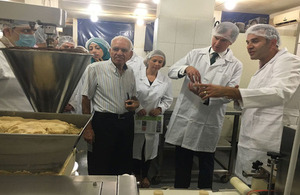UK Supporting Economic Opportunities in Tripoli
We are pleased that the UK and its International partners continue to be part of the positive change the city of Tripoli is witnessing.

Tripoli
At the invitation of Social Affairs Minister Rachid Derbas and as part of his regional visits throughout the country to see how UK Aid is supporting Lebanon, British Ambassador Hugo Shorter visited the northern city of Tripoli.
He called on Mufti Sheikh Dr Malek El Chaar and discussed the latest developments in the country.
In his meeting with Minister Derbas followed by lunch in presence of the mayors of Mina, Abdul Kader Alamuddine and Tripoli, Ahmad Kamareddine, the head of the Chamber of Commerce in the North, Toufic Dabbousi and head of Rachid Karami International Fair, Houssam Koubaiter discussions focused on the latest challenges and opportunities for Tripoli, what UK Aid has supported so far in the city and potential future projects aimed at development and supporting local communities. This includes a $500m project spent on renovating the Old Souk through the Lebanon Host Communities Support Project – LHSP, as well as $7.7m allocated to ‘INTAJ’ programme supporting economic opportunities in the Bekaa and North Lebanon.
Ambassador Shorter visited the port of Tripoli to learn more about proposed plans for rehabilitation of the port, which are currently awaiting assessment under unprecedented cheap loans being offered by the World Bank to help boost the Lebanese economy with large-scale infrastructure projects. This ‘concessional financing’ was made available to Lebanon for the first time in light of the crisis, following on from the London Conference of February this year. Former Minister of Finance Mrs Rayya El Hassan also briefed the ambassador on Tripoli’s Special Economic Zone that supports the city’s economy and private businesses across all sectors in Tripoli and north Lebanon.
Speaking to reporters at the end of his visit from the port, Ambassador Shorter said:
This is my second visit to this great city, and so much has happened since then. We are pleased that the UK and partners within the international community continue to be part of the positive change the city is witnessing. Indeed, some of this progress comes as a result of the commitments made at the London Conference in February 2016. We are working with MOSA and UNDP, and the World Bank is making new cheap loans available to Lebanon that will benefit the port’s entire infrastructure and set up a new railway line. All this makes clear that the international community is determined to continue supporting Lebanon’s stability, security and prosperity. I also had the opportunity to visit an ‘INTAJ’ project funded by the UK and implemented by Mercy Corps, aimed at tackling poverty and providing economic opportunities and see first-hand the positive impact it has had on the lives of those working there.
Social Affairs Minister Rachid Derbas said:
I welcomed today in Tripoli the British ambassador to Lebanon and the accompanying delegation, as a framework for fruitful cooperation between the Lebanese government, the United Kingdom and the European Union, given that Britain is one of the major donors and is very interested in the situation of Syrian refugees and host communities. It is known that the North has a large population of Syrian refugees which has affected the infrastructure and the social and economic situation. The Ambassador is on a scoping visit to meet with heads of municipalities in Tripoli, the Tripoli International Fair, the Chairman of the Chamber of Commerce and Industry and head of the Special Economic Zone in order to discuss the best ways of cooperation between the UK and host communities. This is an occasion to visit the city’s special economic zone, its islands and an opportunity to share UNDP’s study for the rehabilitation of the 7Km waterfront that will change the economic and tourism situation in the city. We hope that the United Kingdom will be our partner in this project.
Shorter also had the chance to visit ‘Sombrero’, to taste some of the confectionery and sweets produced by the factory that has received UK support under ‘INTAJ’ programme led by Mercy Corps to address Lebanese communities’ economic needs. The programme has provided training for staff, consultancy services to review their sales and has led Sombrero to hire 8 employees and investing in business expansion to produce date desserts. ’INTAJ’ has successfully implemented 23 skills courses in Bekaa and North Lebanon, with over 470 people trained. It also provided support to 21 businesses, 8 in Bekaa and 13 in North Lebanon in a range of sectors resulting in 107 people securing full-time and part-time employment. The upcoming period will see 2,400 trainees and support to 120 SMEs over a two year period.